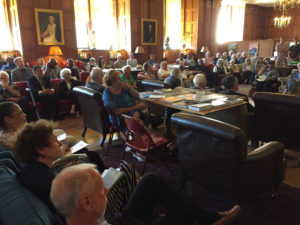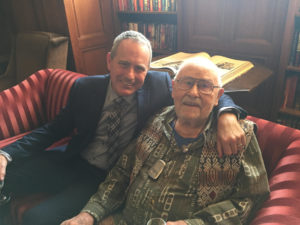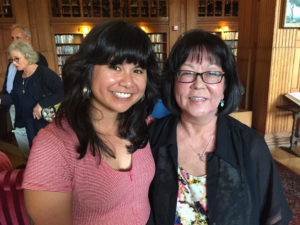From the Director: Oral History, Free Speech & Listening

For the past five years, the Oral History Center at UC Berkeley has hosted an annual event in which we honor and express our gratitude to those individuals who donated their time and energy by agreeing to be interviewed. Held every spring, we run this event as a commencement ceremony. We read the names of each narrator whose interview was completed over the year (111 in 2016-2017!), we show video clips from selected interviews, and then we offer our sincere congratulations to the “Oral History Class” of that year. This event has been amazingly successful, each year attracting nearly 100 individuals. Campus friends, community partners, donors, and, of course, our interviewees and often their families too. The event is equally special to the wide range of our interviewees, whether that be a retired Berkeley professor who has spent decades on campus or to a woman who worked in the shipyards in World War II and despite living a few miles from Berkeley had never stepped foot on campus before this event.
This year, in spite of invitations mailed and catering secured, the event almost didn’t happen. As luck would have it, another event was booked for the same night as our event: controversial conservative pundit Ann Coulter was set to speak on campus. Chances are you know what follows because the whole imbroglio became national news, but here’s a brief rundown to serve as a reminder: conservative provocateur Milo Yiannopoulos was invited by Berkeley College Republicans to speak on campus on February 1, 2017. In response to this anticipated speech, protesters assembled and, later in the evening, the protests turned violent when anarchists took over and ran roughshod over the university and nearby downtown Berkeley, vandalizing businesses and causing general mayhem. People were injured and the university and city suffered fairly widespread (and expensive) property damage. And Milo was prevented from speaking. The College Republicans, frustrated and humiliated by the events of February 1st, doubled-down and invited Ann Coulter to speak. In the weeks and days before her scheduled appearance, rhetoric from all sides flared, initially sparked by anarchists who vowed to use violent tactics to prevent her from speaking. We waited until the last minute, hoping that cooler heads would prevail, but a few days before the event was to take place the university police recommended that we cancel, suggesting that they couldn’t guarantee security to our staff or our attendees — which spooked us a great deal considering that many of those expected to attend were elderly and unfamiliar with the campus.

I personally found the whole set of events depressing, even disturbing, and I began to think about the relationship between free speech and the power of listening, of hearing — and, thus, of the relationship of each to what we practice in our office: oral history. And while this audience needs no definition of oral history, I think it worth mentioning that all of our interviews are preceded by extensive research, the interviews are recorded on digital video and transcribed in their entirety so that interviewees are given the opportunity to review and approve their interviews prior to their release to the public. That is, in a nutshell, how we practice listening, hearing… oral history.
Within a few weeks, we decided to reschedule the event (it was held on June 22nd), and it went off without a hitch! We expected about 60 people to show, but more than 90 people attended, including 98-year old Ed Howden, a legendary civil rights pioneer who staged free speech gatherings on the Berkeley campus when he was a student — in 1940! What follows are the remarks that I prepared for that event and I hope that you find them to be of interest and perhaps inspire you to recognize the importance of the work we do as oral historians in this day and age.
*****
I want to welcome everyone to the Oral History Class of 2017 Commencement Celebration — the fifth annual hosting of this very special event! As you probably know, we needed to reschedule from April because of the anticipated appearance of a controversial speaker on campus, and the threat of violent response by groups of individuals who wanted to prevent that speaker from appearing.
Our event was a casualty of the moment, but one might say that free speech was a casualty too — which is a difficult scenario to watch for someone who relishes in the fact that this university was the birthplace of the Free Speech Movement just over 50 years ago! But, you can breathe a sigh of relief: I’m not going to lecture about that speaker or those who were opposed to her this evening. But I do want to begin this event with a few thoughts about the integral connections between free speech and oral history.
The First Amendment to our Constitution guarantees that “Congress shall make no law … abridging the freedom of speech …” and this has been widely understood to mean that as a people we are granted the right to speak our minds, to pronounce our opinions (popular or unpopular), and even to say things that others might deem obscene or distasteful, so long as these words do not incite violence. As such, our doctrine of free speech is absolutely necessary for the successful practice of oral history — for the practice of recording subjective memories of times past and often opinionated interpretations of the impact of the past on our lives today. Not the interviewer or anyone else can guarantee the right to our narrators to speak freely for that right is granted to them by our most fundamental laws.
Quite happily, our narrators freely invoke their rights and convey stories both mundane and profound, political opinions widely shared and deeply unpopular, accounts of events that hew closely to previously-accepted versions and recollections that depart wildly from what we think we know. As an interviewer, I appreciate — indeed, cherish — everything that comes out in an interview and am always gratified that even in this day and age of perpetual scrutiny of what we say, people still feel a great deal of freedom to speak their minds and share their innermost thoughts. This, I think, is a true strength and contribution of oral history: the creation of a venue for the exercise of the freedom of speech
But there is another element here that I most want to emphasize today — something that is just as necessary and perhaps even more powerful than free speech itself. This is something that we might see as the verso of free speech and this is the call to listen so that all this speech might actually be heard. Indeed, one might argue that we live in a world with too much speech, not nearly enough listening. I think that people tend to speak more loudly and say things that are more extreme not necessarily because they hold true to those beliefs closely but because they feel like they are just not being heard in the first place.
This is where the unrecognized transformative power and importance of oral history resides: oral historians have spent decades (well, millennia if you go back to Herodotus and Thucydides) perfecting the art, the craft, the scholarly methodology of interviewing, of listening, of actually hearing what our narrators are saying. The good oral historian is not merely a passive sounding board, quietly nodding while making sure the recording equipment is working. Instead, the good oral historian listens deeply to what our narrator is saying, simultaneously comparing it to what we’ve heard others say, and then asks follow-up questions seeking clarification, new information, confirmation or disputation of interpretations. In this way, good oral historians communicate to their narrators that they are being heard, that their ideas are being wrestled with, that their version of events … matters!
By being truly heard in this fashion, our narrators don’t typically feel the need to shout, to defame, to become frustrated. Instead, they rise to the occasion and present their stories almost always in thoughtful and in-depth sentences often replete with new insights. Human discourse is elevated in these settings and, well, I think that we are all better for it. Thus, in oral history we discover not only a place in which the freedom of speech is beautifully enacted, but just as importantly, a place in which the person who goes to the trouble of giving their point of view actually feels heard. And, I want to point out that none of this could be actualized without the thoughtful and engaged work done by our staff of interviewers, editors, and technologists or the generous contributions of you, our interviewees.

This is why I’m so proud of the work that we do at the Oral History Center. This is a unique and valuable place in which we solicit, value, and hear stories from people across all walks of life: people who come to us from different economic, education, racial, ethnic, gender, religious, ideological, and political backgrounds and beliefs. In the class of 2017, our interviewees ranged in age from 27 to 98; they were born in the US and abroad and live in states from New York to Oklahoma to California; they are CEOs and social activists; attorneys and welders; former Fire Chiefs and pioneering linguists; they are Republicans, Democrats, independents or their political affiliation is simply unknown to us. I should add that this profound diversity of narrators demonstrates that Berkeley’s Oral History Center does not discriminate by recording interviews only with those whom we view as heroic or as validating beliefs that we hold personally — we seek to interview and to listen to as many varied individuals as possible. We value all voices and we treat each interviewee the same: we endeavor to truly hear what they — what you — have to say.
Martin Meeker
Charles B. Faulhaber Director
Oral History Center at UC Berkeley
June 2017
Highlights from the Oral History Class of 2017!